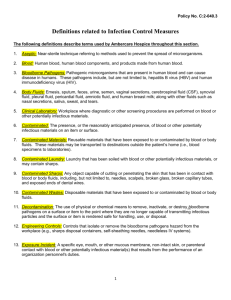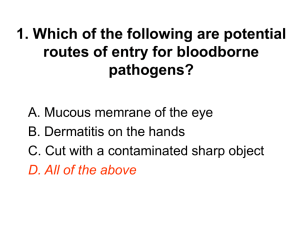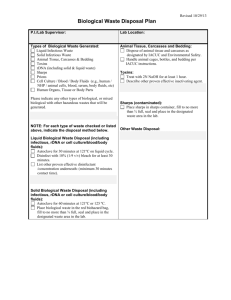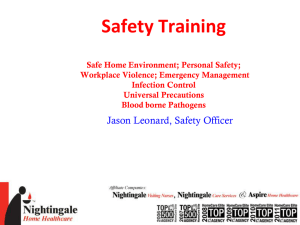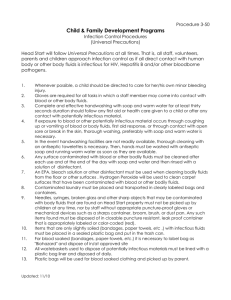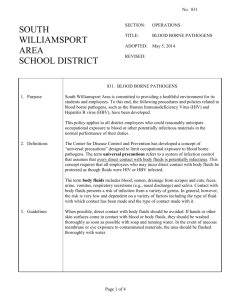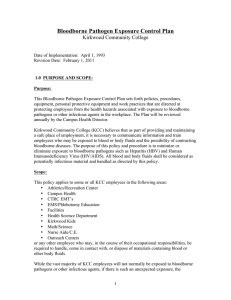C5 - Guidelines for
advertisement
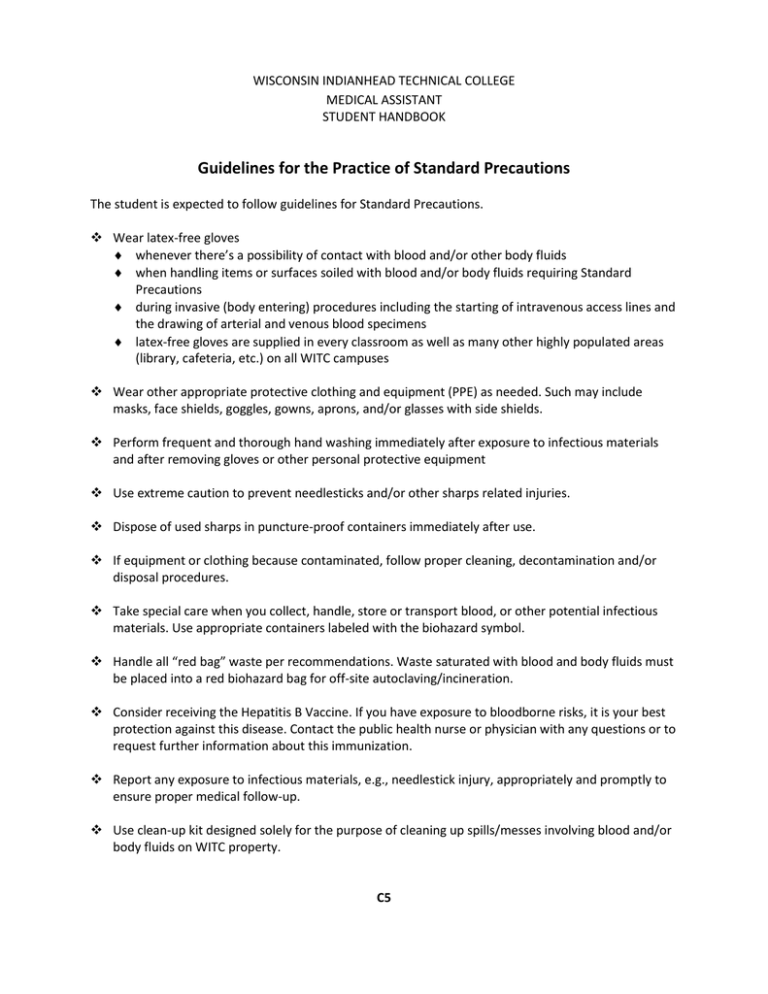
WISCONSIN INDIANHEAD TECHNICAL COLLEGE MEDICAL ASSISTANT STUDENT HANDBOOK Guidelines for the Practice of Standard Precautions The student is expected to follow guidelines for Standard Precautions. Wear latex-free gloves whenever there’s a possibility of contact with blood and/or other body fluids when handling items or surfaces soiled with blood and/or body fluids requiring Standard Precautions during invasive (body entering) procedures including the starting of intravenous access lines and the drawing of arterial and venous blood specimens latex-free gloves are supplied in every classroom as well as many other highly populated areas (library, cafeteria, etc.) on all WITC campuses Wear other appropriate protective clothing and equipment (PPE) as needed. Such may include masks, face shields, goggles, gowns, aprons, and/or glasses with side shields. Perform frequent and thorough hand washing immediately after exposure to infectious materials and after removing gloves or other personal protective equipment Use extreme caution to prevent needlesticks and/or other sharps related injuries. Dispose of used sharps in puncture-proof containers immediately after use. If equipment or clothing because contaminated, follow proper cleaning, decontamination and/or disposal procedures. Take special care when you collect, handle, store or transport blood, or other potential infectious materials. Use appropriate containers labeled with the biohazard symbol. Handle all “red bag” waste per recommendations. Waste saturated with blood and body fluids must be placed into a red biohazard bag for off-site autoclaving/incineration. Consider receiving the Hepatitis B Vaccine. If you have exposure to bloodborne risks, it is your best protection against this disease. Contact the public health nurse or physician with any questions or to request further information about this immunization. Report any exposure to infectious materials, e.g., needlestick injury, appropriately and promptly to ensure proper medical follow-up. Use clean-up kit designed solely for the purpose of cleaning up spills/messes involving blood and/or body fluids on WITC property. C5 PROTECTIVE BARRIERS Wear latex-free gloves: When handling items or surfaces soiled with blood and/or body fluids requiring Standard Precautions. During invasive (body entering) procedures including the starting of intravenous access lines and the drawing of arterial and venous blood specimens (phlebotomy). Injury prevention: Disposable syringes and needles, scalpel blades, and other sharp objects should be placed in a Sharps Management System container. To prevent needle-stick injuries, needles should not be recapped, purposely bent, or broken by hand, removed from disposable syringes, or otherwise manipulated by hand. Use extra caution when working in, around, or with sharp objects, instruments, or machinery. Be sure to use appropriate personal protective gear as necessary and follow all safety guidelines while operating all machinery, tools, and equipment. Standard Precautions Blood and/or Body Fluid Spill Clean-Up Kits Clean-up kits can be found in all custodial areas, as well as the college health nurse’s office. Certain high-risk classrooms will also be stocked with kits. A complete list of areas where clean-up kits are located can be found in the custodian's office and in the college health nurse's office. Go to the nearest, most convenient supply location and obtain a clean-up kit and any extra materials you feel you will need. (Extra materials are stored next to the kits). Take all supplies to the site of the spill/mess. Follow the step-by-step instructions printed on the outside of the clean-up kit. If the accident/injury that caused the spill has resulted in a person or persons exposure to blood and/or body fluids, there are forms that must be completed. Contact any WITC instructor, clerical personnel, or the school nurse for assistance. APPROVED DEFINITIONS (OSHA BLOODBORNE PATHOGENS STANDARD) To define all health care workers the approved definitions of the components of the OSHA Bloodborne Pathogens Standard. REFERENCE: OSHA 29 CFR 1910.1030 Bloodborne Pathogens Standard DATE OF ORIGIN: 06/01/1992 REVIEWED/REVISED: 02/01/1999, 02/27/2009 Definitions. For purposes of this section, the following shall apply: Assistant Secretary means the Assistant Secretary of Labor for Occupational Safety and Health, or designated representative. Blood means human blood, human blood components, and products made from human blood. Bloodborne Pathogens means pathogenic microorganisms that are present in human blood and can cause disease in humans. These pathogens include, but are not limited to, hepatitis B virus (HBV) and human immunodeficiency virus (HIV). Clinical Laboratory means a workplace where diagnostic or other screening procedures are performed on blood or other potentially infectious materials. Contaminated means the presence or the reasonably anticipated presence of blood or other potentially infectious materials on an item or surface. Contaminated Laundry means laundry which has been soiled with blood or other potentially infectious materials or may contain sharps. Contaminated Sharps means any contaminated object that can penetrate the skin including, but not limited to, needles, scalpels, broken glass, broken capillary tubes, and exposed ends of dental wires. Decontamination means the use of physical or chemical means to remove, inactivate, or destroy bloodborne pathogens on a surface or item to the point where they are no longer capable of transmitting infectious particles and the surface or item is rendered safe for handling, use, or disposal. Director means the Director of the National Institute for Occupational Safety and Health, U.S. Department of Health and Human Services, or designated representative. Engineering Controls means controls (e.g., sharps disposal containers, self-sheathing needles, safer medical devices, such as sharps with engineered sharps injury protections and needleless systems) that isolate or remove the bloodborne pathogens hazard from the workplace. Exposure Incident means a specific eye, mouth, other mucous membrane, non-intact skin, or parenteral contact with blood or other potentially infectious materials that results from the performance of an employee's duties. Handwashing Facilities means a facility providing an adequate supply of running potable water, soap and single use towels or hot air drying machines. Licensed Healthcare Professional is a person whose legally permitted scope of practice allows him or her to independently perform the activities required by paragraph (f) Hepatitis B Vaccination and Postexposure Evaluation and Follow-up. HBV means hepatitis B virus. HIV means human immunodeficiency virus. Needleless systems means a device that does not use needles for: (1) The collection of bodily fluids or withdrawal of body fluids after initial venous or arterial access is established; (2) The administration of medication or fluids; or (3) Any other procedure involving the potential for occupational exposure to bloodborne pathogens due to percutaneous injuries from contaminated sharps. Occupational Exposure means reasonably anticipated skin, eye, mucous membrane, or parenteral contact with blood or other potentially infectious materials that may result from the performance of an employee's duties. Other Potentially Infectious Materials means (1) The following human body fluids: semen, vaginal secretions, cerebrospinal fluid, synovial fluid, pleural fluid, pericardial fluid, peritoneal fluid, amniotic fluid, saliva in dental procedures, any body fluid that is visibly contaminated with blood, and all body fluids in situations where it is difficult or impossible to differentiate between body fluids; (2) Any unfixed tissue or organ (other than intact skin) from a human (living or dead); and (3) HIV-containing cell or tissue cultures, organ cultures, and HIV- or HBV-containing culture medium or other solutions; and blood, organs, or other tissues from experimental animals infected with HIV or HBV. Parenteral means piercing mucous membranes or the skin barrier through such events as needlesticks, human bites, cuts, and abrasions. Personal Protective Equipment is specialized clothing or equipment worn by an employee for protection against a hazard. General work clothes (e.g., uniforms, pants, shirts or blouses) not intended to function as protection against a hazard are not considered to be personal protective equipment. Production Facility means a facility engaged in industrial-scale, large-volume or high concentration production of HIV or HBV. Regulated Waste means liquid or semi-liquid blood or other potentially infectious materials; contaminated items that would release blood or other potentially infectious materials in a liquid or semi-liquid state if compressed; items that are caked with dried blood or other potentially infectious materials and are capable of releasing these materials during handling; contaminated sharps; and pathological and microbiological wastes containing blood or other potentially infectious materials. Research Laboratory means a laboratory producing or using research-laboratory-scale amounts of HIV or HBV. Research laboratories may produce high concentrations of HIV or HBV but not in the volume found in production facilities. Sharps with engineered sharps injury protections means a nonneedle sharp or a needle device used for withdrawing body fluids, accessing a vein or artery, or administering medications or other fluids, with a built-in safety feature or mechanism that effectively reduces the risk of an exposure incident. Source Individual means any individual, living or dead, whose blood or other potentially infectious materials may be a source of occupational exposure to the employee. Examples include, but are not limited to, hospital and clinic patients; clients in institutions for the developmentally disabled; trauma victims; clients of drug and alcohol treatment facilities; residents of hospices and nursing homes; human remains; and individuals who donate or sell blood or blood components. Sterilize means the use of a physical or chemical procedure to destroy all microbial life including highly resistant bacterial endospores. Universal Precautions is an approach to infection control. According to the concept of Universal Precautions, all human blood and certain human body fluids are treated as if known to be infectious for HIV, HBV, and other bloodborne pathogens. Work Practice Controls means controls that reduce the likelihood of exposure by altering the manner in which a task is performed (e.g., prohibiting recapping of needles by a two-handed technique). Please take the time to be safe. Think ahead and protect yourself by using the safety equipment made available to you. Do not gamble with your life. For more information, or for answers to your questions, stop by the Health Services Office.
